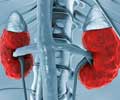The precise cause of kidney failure and identification of those at risk can now be done with DNA sequencing.
Highlights
- DNA sequencing could soon become part of the routine diagnostic workup for patients with chronic kidney disease.
- DNA sequencing could identify the genetic cause of the disease and influence treatment for many patients with chronic kidney disease.
- Chronic Kidney Disease (CKD) is usually silent in the early stages, it may not be detected until an individual develops severe kidney problems.
"Because CKD is usually silent in the early stages, it may not be detected until an individual develops severe kidney problems," said Ali G. Gharavi, MD, professor of medicine and chief of the Division of Nephrology at CUMC.
"At that stage, the patient may be sent to a variety of specialists in order to identify the type and cause of the disease and determine the best treatment.”
Whole exome sequencing Can Help Predict CKD
The research team performed whole exome sequencing--a technique used to analyze DNA from the protein-coding portion of the genome--in 92 adults with kidney disease. More than half had a family history of kidney problems.
- The analysis yielded a diagnosis in 22 of the participants, encompassing 13 different genetic disorders syndromes.
- In 13 individuals, including 9 in whom the cause of kidney failure was unknown, the genetic data either explained the original clinical diagnosis or prompted frank reclassification of the patient's disease.
- Three patients who harbored a mutation in a gene not previously associated with kidney failure, thereby defining a new genetic cause of kidney disease.
- The analysis uncovered a BRCA2 mutation, which led to a diagnosis of breast cancer.
Better Diagnosis
"Our study, though small, demonstrates that whole exome sequencing may offer real clinical value in diagnosing and managing patients with kidney disease, especially those with a family history of kidney problems or those with an unknown cause of disease," said Dr. Gharavi.
"Additional studies, in larger and more diverse patient populations, could help better define which categories of patients would benefit most from genomic sequencing in their clinical workup for kidney disease."
Reference
- Ali G. Gharavi et al., ‘Whole Exome Sequencing in Adults with Chronic Kidney Disease: A Pilot Study.’ Annals of Internal Medicine (2017).
Source-Medindia
















